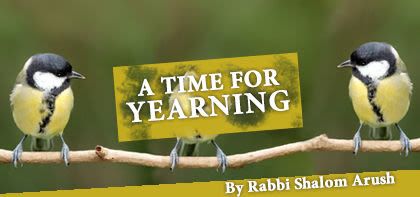
A Time for Yearning
Inner desire is so strong, that even if a person is surrounded by thousands of people engaged in material endeavors, he can still yearn to be close to Hashem...

Our sages tell us that if the Jewish People were to properly observe two Sabbaths in a row, we’d be redeemed immediately.
How does one properly observe Shabbat? Shabbat is a time of enhanced spiritual sensitivity and a time when all of creation particularly yearns for Hashem. Consequently, one Shabbat becomes a personal time for yearning, when each of us yearns to get close to the Creator, then Sabbath observance becomes both a pleasure and easy.
At the close of the sixth day of creation, the entire creation of heaven and earth, galaxies, angels and upper worlds was completed. Everything on earth – mineral, plant, animal and human – was also completed. In biblical Hebrew, the words for “finished” and “yearning” have the same root letters, to indicate that at the completion of creation, heaven and earth yearned for the Creator. Their yearning, as well as the yearning of all the other creations is expressed in Perek Shira, the Song of Creation.
The reason we chant the Vayechulu prayer twice on Friday night, both in our Kabbalat Shabbat prayers  and again during Kiddush, is to enhance our yearning for Hashem at this opportune time, the beginning of the Sabbath, when all of creation is uplifted. As the holy seventh day of rest enters at sundown on the termination of the sixth day, we should keep in mind that all of creation turns to Hashem with heightened yearning. We should follow suit. When Rebbe Nachman of Breslev would say the first word of Kiddush on Friday night, Vayechulu, alluding to the completion of creation at the termination of the sixth day, his soul would almost leave his body because he yearned for Hashem so much.
and again during Kiddush, is to enhance our yearning for Hashem at this opportune time, the beginning of the Sabbath, when all of creation is uplifted. As the holy seventh day of rest enters at sundown on the termination of the sixth day, we should keep in mind that all of creation turns to Hashem with heightened yearning. We should follow suit. When Rebbe Nachman of Breslev would say the first word of Kiddush on Friday night, Vayechulu, alluding to the completion of creation at the termination of the sixth day, his soul would almost leave his body because he yearned for Hashem so much.
Although Friday night is an opportune time to yearn for Hashem, one can have access to Hashem all week long, 24 hours a day. All a person has to do is to ponder Hashem and simply desire to get close to Him. Any person can do this at any time. One doesn’t have to be in a synagogue to seek Hashem, nor does one have to be a Talmudic scholar or Kabbalist to cling to Hashem. No forces of evil can blemish a person’s desires, for desire is above everything. Inner desire is so strong, that even if a person is surrounded by thousands of people engaged in material endeavors, such as in the middle of a stadium or an airport, he can still yearn to be close to Hashem. Hashem’s light is everywhere and available to everyone who seeks Him. One should always have strong and positive desires for everything holy at all times.
Yearning for Hashem is an aspect of the Sabbath, which is total holiness. A person who yearns for Hashem in the middle of the week therefore tastes the Sabbath. One should attempt to reach the level of total holiness, where one’s thoughts, deeds, and speech are connected to Hashem all week long. This adds indescribable vitality to a person’s life. Rebbe Natan said that the epitome of good is having good desires, when a person yearns to get closer to Hashem and to cling to Him. This is a virtue above all virtues.
We are therefore commanded to remember the Sabbath every day of the week. “Sabbath” in Hebrew, Shabbat, is synonymous to the word “week”. In Jewish tradition, we don’t have names for the days like “Sunday” and “Monday”; we refer to the days of the week as “the first day of the Shabbat”, “the second day of the Shabbat” and so on. As such, we remember the Shabbat every single day of the week. The entire purpose of creation is to sanctify the Sabbath, the seventh day, when all of creation renews its yearning for Hashem just it did on the very first Sabbath of history. Sabbath gives us the spiritual energy and vitality to seek the Creator and to yearn for Him.







Tell us what you think!
Thank you for your comment!
It will be published after approval by the Editor.